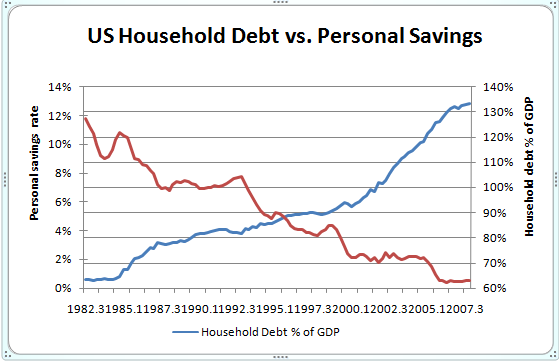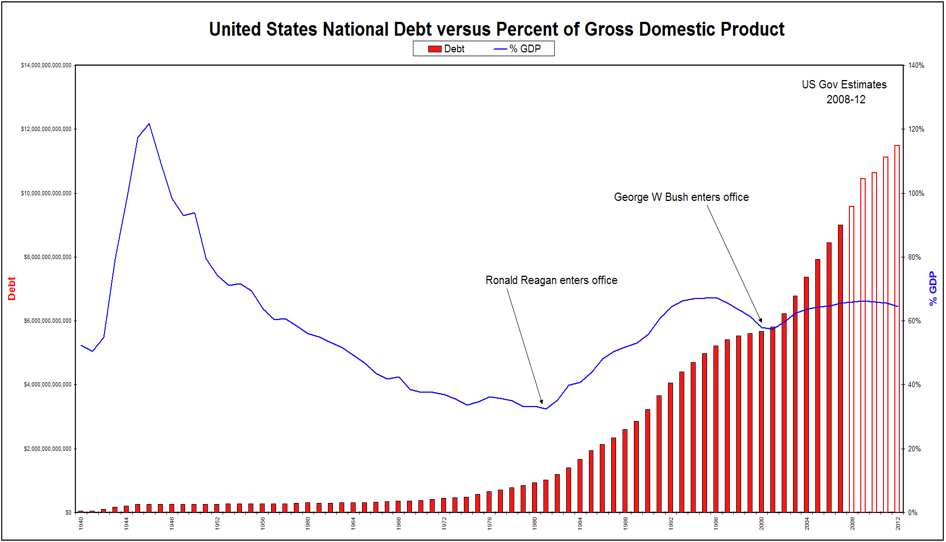The first section of his talk was a review of his long-held belief that the U.S. economy is catastrophically unsound due to government intervention in the economy over the last two decades. A talk (which you can watch on youtube) he gave two years ago to the national association of mortgage brokers lays out his case in roughly the same way he laid it out at this recent talk. His argument has many pillars, but the main idea is that the government, in a series of efforts to hide, defer, or delay negative economic developments (like a recession where lots of people loose their jobs), have only succeeded in pushing the pain out into the future, where the pain will be much, much worse that if we had suffered a small amount of pain at the time. For example, when the dot-com bubble burst in 2001, we should have had a recession then. Instead, we had a very isolated set of job losses in the tech sector, and the overall economy quickly rebounded, led by what? Yes, you guessed it, the real estate bubble.
Why did we have a real estate bubble after the dot-com bubble burst? Due to the massive intervention of the government via the Federal Reserve to lower interest rates to make it easy to borrow, and by the President and the Congress with their Freddie and Fannie boondoggle to juice up the housing market as a quick fix to boost the economy and prevent a recession. Well that worked, sort of, by pushing out the recession that we should have had in 2001 and 2002, all the way out to now in 2008. But in those 6 or 7 years, a whole lot of dry rot has been festering in the foundations of our economic system. Instead of cleaning it out back then and building on a solid foundation, we've built up a huge bubble economy that is collapsing before our eyes. Lehman Brothers, Bear Sterns, Merrill Lynch, Citibank, and others, these are names that I grew up with that meant things to me like "stability", "security", "sound money", "Wall Street financial wizards". It's inconceivable to me that companies like that got so far out of whack that they could collapse into dust literally overnight.
Why did we have a real estate bubble after the dot-com bubble burst? Due to the massive intervention of the government via the Federal Reserve to lower interest rates to make it easy to borrow, and by the President and the Congress with their Freddie and Fannie boondoggle to juice up the housing market as a quick fix to boost the economy and prevent a recession. Well that worked, sort of, by pushing out the recession that we should have had in 2001 and 2002, all the way out to now in 2008. But in those 6 or 7 years, a whole lot of dry rot has been festering in the foundations of our economic system. Instead of cleaning it out back then and building on a solid foundation, we've built up a huge bubble economy that is collapsing before our eyes. Lehman Brothers, Bear Sterns, Merrill Lynch, Citibank, and others, these are names that I grew up with that meant things to me like "stability", "security", "sound money", "Wall Street financial wizards". It's inconceivable to me that companies like that got so far out of whack that they could collapse into dust literally overnight.
Mr. Schiff is a student of the "Austrian School" of economics, a tradition of economic scholarship founded I believe by Ludwig von Mieses (learn more at http://mises.org), which by studying history of past economic failures, has developed a persuasive case that economies should be allowed to go through boom and bust periods without government intervention. The basic idea is that industries and businesses should be allowed to fail or succeed on their own. If they are failing, it's because they are, perhaps, no longer producing products people want, or inefficient, or any number of reasons. But preventing them from failing is only preventing the natural ebb and flow of the economy in which new companies and industries may arise to take their place.
The U.S. auto industry bailout is a case in point. Ford, GM, and Chrysler are clearly bloated, inefficient companies that produce products that few people want to buy. Why not let them fail and allow new auto companies to take their place? What good will come of keeping them alive for one or two more years on government life-support?
But back to Mr. Schiff's talk. His take on what is going on now is that it is more of the same bad medicine that made us sick in the first place is being given to us again. More cheap credit by lowering interest rates, government programs to prop up the economy, more borrowing from foreign lenders to push off the bills to the future. We are, he says, like a person who is paying off their credit card debt by making the minimum monthly payments using cash advances from a new credit card, and paying for their living expenses by racking up even more credit card debt. This all ends in bankruptcy when the credit card companies eventually notice that you will never be able to pay back all the debt you have racked up, and stop giving you new credit cards. Similarly on a much larger scale, the foreign lenders (like China) who are buying U.S. Treasury bonds by the trillions will eventually wise up and notice that we are building up such massive amounts of debt that we will never, ever be able to pay it all back. When they pull the plug, by ceasing to put all their currency reserves in U.S. dollars, the jig will be up. The entire U.S. economy will be like Lehman Brothers, Merrill Lynch and Washington Mutual, Fannie, Freddie, GM and Ford combined, times a billion.
Think about it. Where is all this money coming from, $700 billion bank bailout, $30 billion auto industry bailout, the Obama New Deal to build roads, schools and universal broadband Internet? We don't have any money. We aren't saving money. The national savings rate is near zero. We aren't producing enough products that we can sell to the rest of the world to finance all the products we need to buy from the rest of the world. We have massive trade deficits. We have a $8.5 trillion dollar budget deficit built up over the last 20 years. We have programs like Social Security, Medicare, government pension plans and other programs that have been promised to people that will cost over $40 trillion in the coming years. The whole thing is a house built on sand.
Think about it. Where is all this money coming from, $700 billion bank bailout, $30 billion auto industry bailout, the Obama New Deal to build roads, schools and universal broadband Internet? We don't have any money. We aren't saving money. The national savings rate is near zero. We aren't producing enough products that we can sell to the rest of the world to finance all the products we need to buy from the rest of the world. We have massive trade deficits. We have a $8.5 trillion dollar budget deficit built up over the last 20 years. We have programs like Social Security, Medicare, government pension plans and other programs that have been promised to people that will cost over $40 trillion in the coming years. The whole thing is a house built on sand.
So where do we go from here? Mr. Schiff is saying that the U.S. economy will essentially collapse in the coming years, and will finally undergo the changes that should have been made years ago. We will start producing products people want to buy. Our manufacturing industry that has been outsourced abroad will revive here in America. We will start spending less that we earn instead of borrowing so that we can spend more than we earn, both as individuals and as a nation. But that process will take about 10 years. In the meantime, he predicts a few things. The collapse in the value of the U.S. dollar, the collapse of the U.S. housing market, massive unemployment and ultimately hyperinflation as fewer and fewer products are imported from abroad (since we can no longer afford them) and lots of worthless U.S. dollars chase fewer and fewer available products.
What does he recommend that you do? He covers this in his latest book, The Little Book of Bull Moves in Bear Markets. Downsize your lifestyle, save as much cash as you can. Keep reserves to live on for six months. And anything you have to invest, invest in a mix of gold, and stocks in companies outside the United States that produce essentials, like energy, food, or construction. Those companies should pay a high rate of dividends and be in countries with sound, growing economies. Look at your career. Jobs related to banking, real estate, overseas travel, and luxury services are going to be scarce. Jobs will be in the basics: manufacturing, food production, agriculture, energy, computer technology, construction, clothing production. People will fix what they have instead of buying new products, so auto repair, appliance repair, and clothing repair will be big. There is time now to learn new skills.
Could he be wrong? Of course he could, and I sincerely hope his more dire predictions don't happen. But I'm not counting on it. And the things he recommends that we do to prepare are sound ideas in a good or bad economy. Spend less, save, invest wisely, and build up skills in a job that has good prospects for the long term. It's common sense, that if practiced by each of us as individuals, will collectively add up to a sound national economy. After all, the goverment is us, we elect them, and their failure is our failure. When we stand up as individuals and manage our personal affairs with wisdom and common sense, we will elect a goverment that manages the nations economy in the same way.






